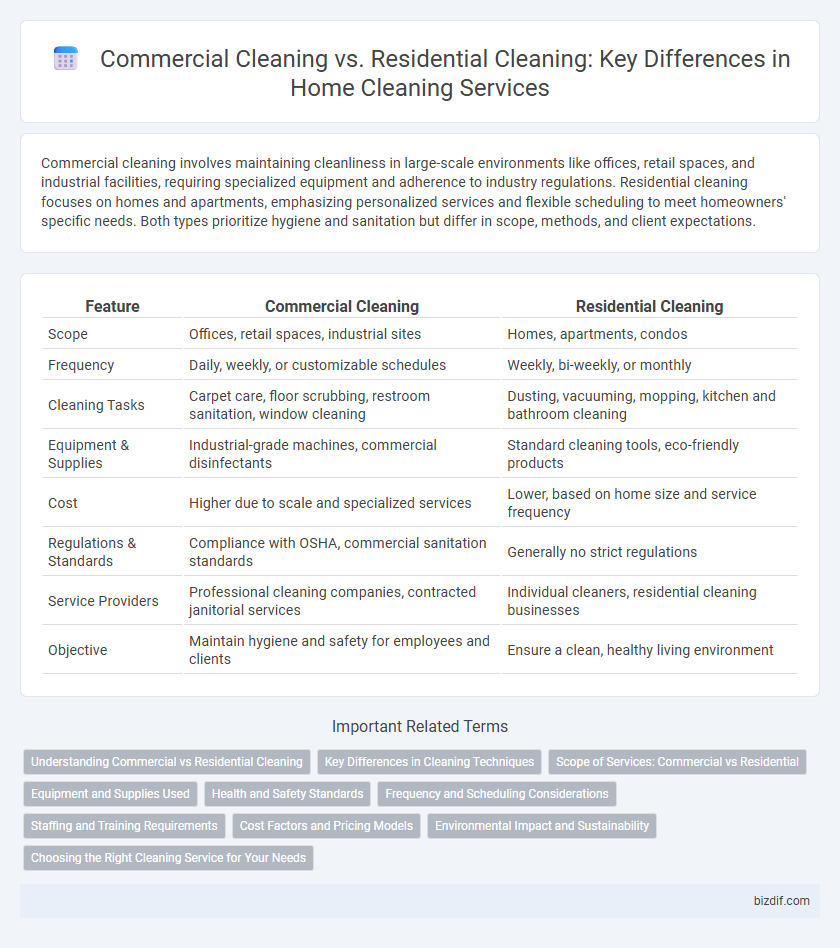Commercial cleaning involves maintaining cleanliness in large-scale environments like offices, retail spaces, and industrial facilities, requiring specialized equipment and adherence to industry regulations. Residential cleaning focuses on homes and apartments, emphasizing personalized services and flexible scheduling to meet homeowners' specific needs. Both types prioritize hygiene and sanitation but differ in scope, methods, and client expectations.
Table of Comparison
| Feature | Commercial Cleaning | Residential Cleaning |
|---|---|---|
| Scope | Offices, retail spaces, industrial sites | Homes, apartments, condos |
| Frequency | Daily, weekly, or customizable schedules | Weekly, bi-weekly, or monthly |
| Cleaning Tasks | Carpet care, floor scrubbing, restroom sanitation, window cleaning | Dusting, vacuuming, mopping, kitchen and bathroom cleaning |
| Equipment & Supplies | Industrial-grade machines, commercial disinfectants | Standard cleaning tools, eco-friendly products |
| Cost | Higher due to scale and specialized services | Lower, based on home size and service frequency |
| Regulations & Standards | Compliance with OSHA, commercial sanitation standards | Generally no strict regulations |
| Service Providers | Professional cleaning companies, contracted janitorial services | Individual cleaners, residential cleaning businesses |
| Objective | Maintain hygiene and safety for employees and clients | Ensure a clean, healthy living environment |
Understanding Commercial vs Residential Cleaning
Commercial cleaning involves specialized services for large-scale spaces such as offices, retail stores, and industrial facilities, emphasizing disinfection, compliance with health regulations, and maintaining high traffic areas. Residential cleaning focuses on personalized cleaning tasks within homes, including dusting, vacuuming, and sanitizing kitchens and bathrooms, catering to individual preferences and household routines. Understanding the distinct requirements of commercial versus residential cleaning ensures proper cleaning methods, equipment, and frequency to meet specific environments effectively.
Key Differences in Cleaning Techniques
Commercial cleaning employs industrial-grade equipment and specialized chemicals to handle large-scale, high-traffic areas such as offices and retail spaces, ensuring hygienic standards and surface durability. Residential cleaning focuses on gentle, multi-surface techniques tailored for homes, using eco-friendly products to protect delicate furniture, flooring, and personal belongings. The frequency and depth of cleaning also vary, with commercial services often requiring routine, scheduled maintenance, while residential cleaning adapts to individual household needs.
Scope of Services: Commercial vs Residential
Commercial cleaning encompasses a broader scope of services, including specialized tasks like floor stripping, window washing, and sanitation of high-traffic areas in offices, retail spaces, and industrial facilities. Residential cleaning focuses on routine maintenance such as dusting, vacuuming, kitchen and bathroom cleaning, and general tidying tailored to living spaces. The scale and complexity of commercial cleaning require more intensive equipment and adherence to industry-specific standards compared to the personalized services of residential cleaning.
Equipment and Supplies Used
Commercial cleaning utilizes heavy-duty equipment such as industrial vacuums, floor scrubbers, and high-capacity carpet extractors designed for large-scale, high-traffic areas. Residential cleaning relies on lighter tools like standard vacuum cleaners, microfiber cloths, and general-purpose cleaning agents suitable for home environments. The choice of supplies reflects the cleaning scope, with commercial products emphasizing durability and efficiency, while residential products prioritize safety and surface sensitivity.
Health and Safety Standards
Commercial cleaning adheres to strict health and safety standards, including OSHA regulations and the use of industrial-grade disinfectants to reduce workplace hazards and prevent the spread of illness. Residential cleaning focuses on eco-friendly and non-toxic products to ensure a safe environment for families, especially children and pets. Both services prioritize hygiene but differ in compliance requirements and chemicals used to meet their specific health and safety protocols.
Frequency and Scheduling Considerations
Commercial cleaning typically requires more frequent and flexible scheduling, often involving daily or nightly services to maintain high-traffic environments like offices and retail spaces. Residential cleaning usually occurs on a weekly or bi-weekly basis, tailored to homeowners' convenience and lifestyle needs. Effective scheduling for commercial properties prioritizes minimizing disruption during business hours, whereas residential cleaning can be more adaptable to occupant availability.
Staffing and Training Requirements
Commercial cleaning requires specialized staffing with extensive training in handling diverse environments like offices, retail spaces, and industrial sites, emphasizing compliance with safety regulations and efficient time management. Residential cleaning staff are trained to focus on personalized services, attention to detail, and safe handling of household products while accommodating varying client preferences. The distinct training programs for commercial and residential cleaners ensure that staff possess the skills necessary to meet the specific demands of each setting, enhancing service quality and customer satisfaction.
Cost Factors and Pricing Models
Commercial cleaning services typically involve higher costs due to larger spaces, specialized equipment, and regulatory compliance requirements, with pricing models often based on square footage or contract frequency. Residential cleaning generally features lower prices reflecting smaller areas and less complex tasks, and pricing can be hourly or per-visit, sometimes influenced by the number of rooms or service add-ons. Understanding these cost factors helps clients choose between flat-rate packages, subscription models, or customized quotes tailored to specific cleaning needs in either commercial or residential environments.
Environmental Impact and Sustainability
Commercial cleaning often utilizes industrial-grade products and equipment that may contain stronger chemicals, leading to a higher environmental footprint compared to residential cleaning. Residential cleaning typically employs more eco-friendly, biodegradable products tailored for smaller spaces, minimizing waste and chemical exposure. Emphasizing sustainable practices in both sectors can significantly reduce pollution, conserve water, and promote healthier indoor air quality.
Choosing the Right Cleaning Service for Your Needs
Selecting the appropriate cleaning service depends on your specific environment and requirements, with commercial cleaning tailored for offices, retail spaces, and industrial settings, offering specialized equipment and techniques to handle larger areas and higher foot traffic. Residential cleaning focuses on homes, providing personalized services such as dusting, vacuuming, and kitchen sanitation, ensuring a comfortable, hygienic living space. Evaluating factors like frequency, cleaning scope, and budget helps determine whether commercial or residential cleaning services best suit your needs.
Commercial Cleaning vs Residential Cleaning Infographic

 bizdif.com
bizdif.com